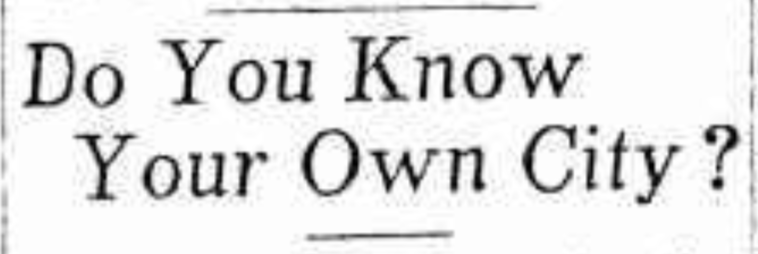
On Dec. 30, 1911, the Schenectady Gazette asked on its front page, “Do You Know Your Own City?” It then posed questions about Schenectady that “will be answered by the committee on social service in the Men and Religion Forward Movement while making the general survey of the city.”
Even in a time of great interest in citizenship, it must be said, most or all of these questions would have required some significant research. For example:
- What is the population?
- How many are foreign born?
- How many different church denominations are represented?
- Has Schenectady reached the borrowing limit?
- How many automobile licenses were issued last year?
- Name ten of our most influential citizens.
- How many lodges and similar fraternal organizations here?
- How many social clubs for men and boys?
- How many musical organizations?
- What percentage of workers in each trade are at the present time unemployed?
- Is there anything like a “sweating system” here?
- What are the means of conciliation and arbitration in case of strikes?
- Are there barmaids in any of the saloons?
- How many of the saloons serve free lunches?
- What is there in our city in the nature of a substitute for the saloon?
- How many dance halls, and what is the usual time of closing?
- How many men, women, boys and girls were arrested this year? For what crimes?
- What is the law in regard to non-supporting or deserting husbands?
- What ordinances are not enforced?
- Who removes the garbage, rubbish and filth, how often and on what terms?
- Are the police stations used for lodging places for the shelterless?
- How many inmates in the hospitals? How are the hospitals supported?
- Is there a city dispensary? Where?
- What provision is made by the city for the care of infants, dependent children, and delinquents?
By the way, if you can make the distinction between garbage, rubbish and filth, you’re more of a waste expert than we are.
The article concluded that “it is probable that the findings of the committee will be printed when the canvass is completed. The survey will make instructive and interesting reading to every Schenectadian.”
We were curious about the Men and Religion Forward movement — it turns out to have a been a relatively short-lived response to concerns that women were playing too big a role in the Protestant church. It was a revival campaign from Sept. 1911 through April 1912 to recruit men for Protestant churches, as purveyors of “muscular Christianity,” which encouraged vigorous exercise.
In 1912, some of the purpose of the social surveys, which were conducted in numerous cities, was revealed, in an article saying that the surveys “have revealed many conditions in most cities which it is the duty of the churches to right. It is little use to ask a man working twelve hours a day for seven days in the week to quit the saloon at night and come to church. For most of them there is little pleasure left excepting the false joy of stimulants. The church must set itself actively to work to secure for him more reasonable hours for work and then it can approach him with some hope of success.” The movement was very supportive of labor reforms that would allow workers more time for churching up.
In February 1912, some of the information (and the purpose for asking it) was revealed in a brief article, which said the survey was incomplete in many instances but that it showed “some very interesting statistics of conditions in the civic, social, and religious life of Schenectady.” Among those statistics: there are 209 saloons and 47 hotels in the city that sold liquor, not counting wholesalers and druggists. They showed that taxes on such places amounted to less than $200,000 a year, while they attributed costs to the city of about $170,000 for support of police, courts, charities, jail, penitentiary, and reform school as being due directly or indirectly to “the drink habit.” They found that of the 2,010 arrests made in 1911, 1624 were “intemperate cases, 605 were Americans, 1405 of other nationalities, 1,248 were single and 762 married persons.” 138 women, 66 boys and 14 girls were among the arrestees. The survey put the total number of church members in the city as 72,896 — about 43,000 Protestants, 27,000 Catholics, and 3,000 Jews.

Leave a Reply